Collective Leadership and Movement Building
“I am a home care worker, and I save lives. So why am I paid poverty wages?” LaTanya Cline demanded of an ebullient crowd of domestic workers, unionists and their families at the Justice for Homecare Tribunal in Sacramento. In March 2015, more than 200 members of the California Domestic Workers Coalition traveled to the state capital to demand a living wage, overtime pay and dignity for homecare workers and workers who take care of seniors and people with disabilities.
The coalition’s contingent included several worker-organizers from Mujeres Unidas y Activas (MUA), a powerful grassroots organization of Latina immigrant women in the Bay Area. MUA members are raising their voices and asserting their leadership to demand dignity, safety and recognition of the vital services they provide as housekeepers, nannies and caregivers.
Domestic Work Is Invisible Work
“There is an entrenched devaluation of immigrant women workers. Domestic workers are breadwinners of their families throughout Latin America and Asia. In so many ways they are uplifting the economies of their countries through remittances,” said Katie Joaquin, campaign director of the California Domestic Workers Coalition. “We see this as an international struggle that is critical to the leadership of women,” she said.
There are nearly two million domestic workers in the United States, more than 90 percent of them women, mostly low-income immigrant women from diverse ethnicities. Over the past 25 years, MUA has built a worker-center model of sharing power and harnessing workers’ collective bargaining rights. MUA builds the personal and collective leadership, and power of immigrant Latina women, many undocumented, who are disproportionately affected by economic and political marginalization, racism and violence. MUA also works to create safe pathways to citizenship, preventing deportation of immigrant women and their families.
“I Learned That I Have Value.”
 (Photo: Rucha Chitnis)MUA is rooted in the belief that every woman who walks through its door is a leader. The leadership program is designed to ensure the self-determination of women at home, and through policies which are being shaped by rigorous organizing by domestic workers from coast to coast in the United States. “For the first time I learned that I have value,” said Lupe Zamuldio, an undocumented worker from Mexico who recently completed MUA’s leadership training. “All my life, I walked with my head down. I didn’t know about my rights as an immigrant worker. Today I walk tall and realize that I have value in the society as well.”
(Photo: Rucha Chitnis)MUA is rooted in the belief that every woman who walks through its door is a leader. The leadership program is designed to ensure the self-determination of women at home, and through policies which are being shaped by rigorous organizing by domestic workers from coast to coast in the United States. “For the first time I learned that I have value,” said Lupe Zamuldio, an undocumented worker from Mexico who recently completed MUA’s leadership training. “All my life, I walked with my head down. I didn’t know about my rights as an immigrant worker. Today I walk tall and realize that I have value in the society as well.”
Claudia Reyes, MUA’s lead organizer for workers’ rights, explained that this program also offers a place for women to talk about the various traumas they have experienced and begin the process of healing in a safe space of sisterhood. Issues of racism, patriarchy, legal and economic rights are also part of the leadership curriculum. Many members have survived domestic violence, including MUA’s resilient co-director, Juana Flores, and receive counseling and advice from certified domestic violence advocates and sexual assault crisis counselors.
Claudia’s mother, Maria Huerta Reyes, is an iconic elder in the space – a former domestic worker who joined MUA nearly 17 years ago, and became a powerful advocate for the rights of immigrant women. Maria has recruited hundreds of women to join MUA, participated in hunger strikes for immigrant rights, traveled countless times to Sacramento to organize for the California Domestic Worker Bill of Rights and served as president of MUA’s board of directors. Maria’s leadership journey has inspired and energized other domestic workers, and this year she was honored with a special “movement leader” recognition at MUA’s 25th Anniversary Celebrations in San Francisco.
The Future of California’s Domestic Workers
In 2013, MUA members played a key role in winning the passage of the historic California Domestic Worker Bill of Rights (AB 241), after an eight-year process of movement- and coalition-building. This significant legislative victory extends overtime protections to women who care for and support hundreds of thousands of individuals and families in California. MUA and its allies at the California Domestic Workers Coalition are now gearing up to introduce a 2016 bill to make these protections permanent; provisions of the bill passed in 2013 are due to expire in 2017.
“There is tremendous strength to link with other organizations. We knew that in order to win, we had to be grounded in the leadership of immigrant women and build the strength of coalitions. A lot of worker organizations have worked hard to shift the visibility and consciousness of domestic work… and the Bill, and the organizing of immigrant women also helped to shift the consciousness of policymakers,” said Katie Joaquin.
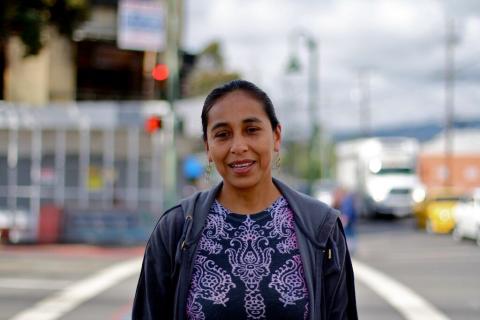 Lupe Zamuldio migrated to the United States from Mexico in 2001. “The first job that I was offered was working as a full-time nanny, housekeeper and cook for a family for $100 a month,” Lupe says. “This seemed very unreasonable to me, and I refused the offer. I ended up working at a panaderia (a bakery) as a cook and cleaner for a starting hourly wage of $6 an hour.” (Photo: Rucha Chitnis)
Lupe Zamuldio migrated to the United States from Mexico in 2001. “The first job that I was offered was working as a full-time nanny, housekeeper and cook for a family for $100 a month,” Lupe says. “This seemed very unreasonable to me, and I refused the offer. I ended up working at a panaderia (a bakery) as a cook and cleaner for a starting hourly wage of $6 an hour.” (Photo: Rucha Chitnis)
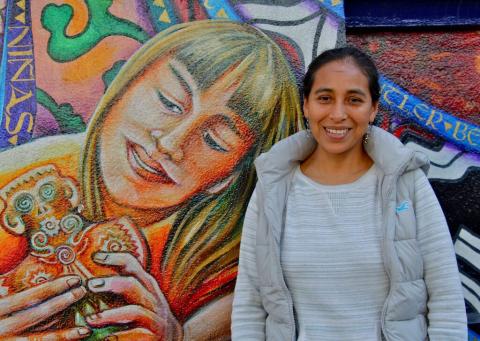 As an undocumented immigrant worker, Lupe says she was unaware of her economic and legal rights. After a family dispute arose, someone suggested she contact Mujeres Unidas y Activas (MUA), and visit their offices in the Fruitvale neighborhood of Oakland. “At MUA, I received legal advice for my personal family matter, as well as legal counseling for my immigration status. I now have filed my papers, and I am on track to get legal status,” Lupe said. She ended up participating in MUA’s leadership program, where she learned about her labor and legal rights and recognized her personal leadership potential. (Photo: Rucha Chitnis)
As an undocumented immigrant worker, Lupe says she was unaware of her economic and legal rights. After a family dispute arose, someone suggested she contact Mujeres Unidas y Activas (MUA), and visit their offices in the Fruitvale neighborhood of Oakland. “At MUA, I received legal advice for my personal family matter, as well as legal counseling for my immigration status. I now have filed my papers, and I am on track to get legal status,” Lupe said. She ended up participating in MUA’s leadership program, where she learned about her labor and legal rights and recognized her personal leadership potential. (Photo: Rucha Chitnis)
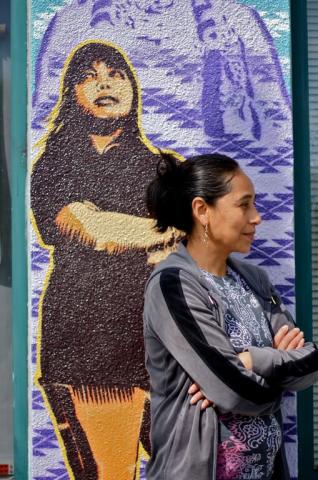 “For the first time, I learned that I have value,” said Lupe. “I walk with my head high.” She is now determined to refer other women to MUA, especially those who are battered from domestic violence. Her employer at the panaderia ended up being sued for violating wage and hour laws, and after being underpaid for nearly 12 years, Lupe is now receiving a minimum wage of $12.50 an hour and lunch breaks. “I want to keep learning and developing myself. I am learning to trust myself, and I would love to study law or teach,” she says. (Photo: Rucha Chitnis)
“For the first time, I learned that I have value,” said Lupe. “I walk with my head high.” She is now determined to refer other women to MUA, especially those who are battered from domestic violence. Her employer at the panaderia ended up being sued for violating wage and hour laws, and after being underpaid for nearly 12 years, Lupe is now receiving a minimum wage of $12.50 an hour and lunch breaks. “I want to keep learning and developing myself. I am learning to trust myself, and I would love to study law or teach,” she says. (Photo: Rucha Chitnis)
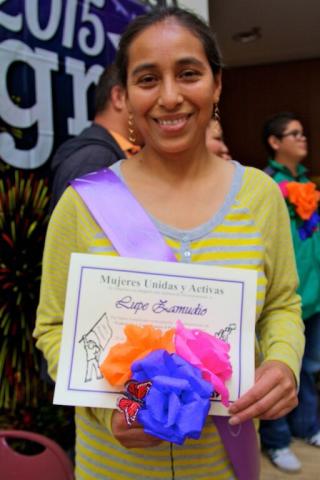 The MUA leadership program affirms the holistic self-determination of immigrant Latina domestic workers – at home, at work, and in state policies. (Photo: Rucha Chitnis)
The MUA leadership program affirms the holistic self-determination of immigrant Latina domestic workers – at home, at work, and in state policies. (Photo: Rucha Chitnis)
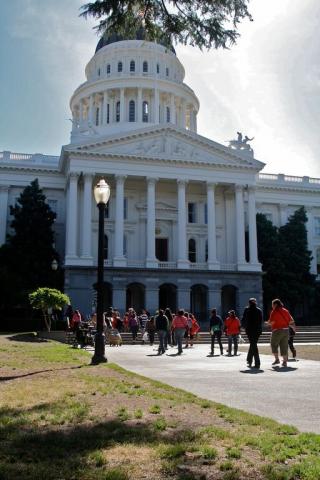 MUA believes in the power of networks and alliances. In March 2015, MUA members headed to Sacramento to offer solidarity at the Justice for Homecare Tribunal, and advocate for labor rights, fair living wages and the right to overtime compensation. (Photo: Rucha Chitnis)
MUA believes in the power of networks and alliances. In March 2015, MUA members headed to Sacramento to offer solidarity at the Justice for Homecare Tribunal, and advocate for labor rights, fair living wages and the right to overtime compensation. (Photo: Rucha Chitnis)
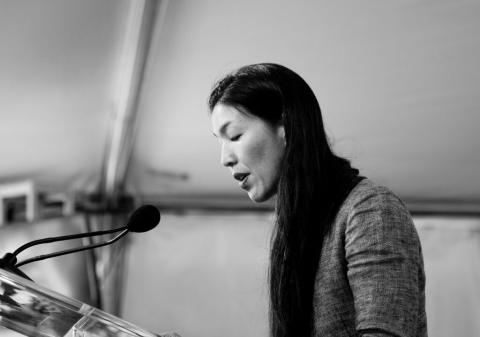 “If you care about women’s rights, you should care about home care workers, the majority of whom are women,” said Ai-jen Poo at the tribunal. “My grandmother can age in dignity because of her caregiver,” said Poo, director of the National Domestic Workers’ Alliance. (Photo: Rucha Chitnis)
“If you care about women’s rights, you should care about home care workers, the majority of whom are women,” said Ai-jen Poo at the tribunal. “My grandmother can age in dignity because of her caregiver,” said Poo, director of the National Domestic Workers’ Alliance. (Photo: Rucha Chitnis)
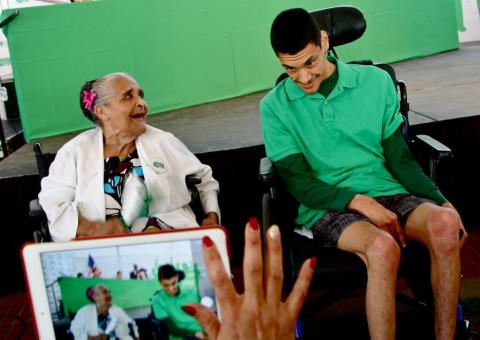 UA and its allied labor unions believe that people with disabilities and elders benefit when the rights of homecare workers are protected. “In-Home Supportive Services allows so many families like mine to keep going even when the unexpected happens. Not only do our clients and loved ones get to stay at home, where studies show they are happier and healthier, but homecare also keeps them out of costly institutions and nursing homes – saving the government billions of dollars every year,” home care worker LaTanya Cline said in her testimony. MUA and its allied labor unions believe that people with disabilities and elders benefit when the rights of homecare workers are protected. “In-Home Supportive Services allows so many families like mine to keep going even when the unexpected happens. Not only do our clients and loved ones get to stay at home, where studies show they are happier and healthier, but homecare also keeps them out of costly institutions and nursing homes – saving the government billions of dollars every year,” home care worker LaTanya Cline said in her testimony. (Photo: Rucha Chitnis)
UA and its allied labor unions believe that people with disabilities and elders benefit when the rights of homecare workers are protected. “In-Home Supportive Services allows so many families like mine to keep going even when the unexpected happens. Not only do our clients and loved ones get to stay at home, where studies show they are happier and healthier, but homecare also keeps them out of costly institutions and nursing homes – saving the government billions of dollars every year,” home care worker LaTanya Cline said in her testimony. MUA and its allied labor unions believe that people with disabilities and elders benefit when the rights of homecare workers are protected. “In-Home Supportive Services allows so many families like mine to keep going even when the unexpected happens. Not only do our clients and loved ones get to stay at home, where studies show they are happier and healthier, but homecare also keeps them out of costly institutions and nursing homes – saving the government billions of dollars every year,” home care worker LaTanya Cline said in her testimony. (Photo: Rucha Chitnis)
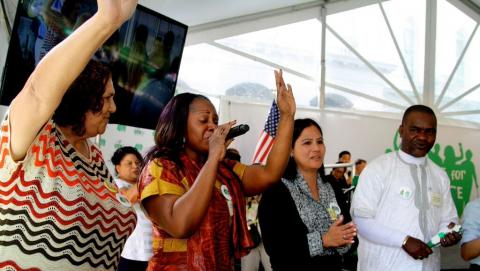 “My mother was a kitchen girl, my father was a garden boy, that’s why I am a unionist!” sang domestic worker organizers from South Africa, Jordan, Morocco and Hong Kong. “We see this as an international struggle that is critical for the leadership of women,” said Katie Joaquin, campaign director of the California Domestic Workers Coalition. (Photo: Rucha Chitnis)
“My mother was a kitchen girl, my father was a garden boy, that’s why I am a unionist!” sang domestic worker organizers from South Africa, Jordan, Morocco and Hong Kong. “We see this as an international struggle that is critical for the leadership of women,” said Katie Joaquin, campaign director of the California Domestic Workers Coalition. (Photo: Rucha Chitnis)
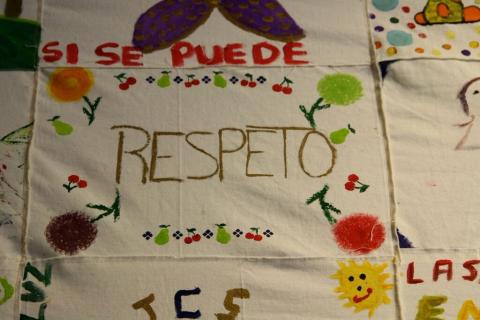 “There is an entrenched devaluation of immigrant women workers. Economic justice is important to have freedom and dignity for women. At the heart of the issues of domestic violence is the inability for women to leave a partnership that is abusive if there is no way to economically sustain themselves and their children,” said Joaquin. (Photo: Rucha Chitnis)
“There is an entrenched devaluation of immigrant women workers. Economic justice is important to have freedom and dignity for women. At the heart of the issues of domestic violence is the inability for women to leave a partnership that is abusive if there is no way to economically sustain themselves and their children,” said Joaquin. (Photo: Rucha Chitnis)
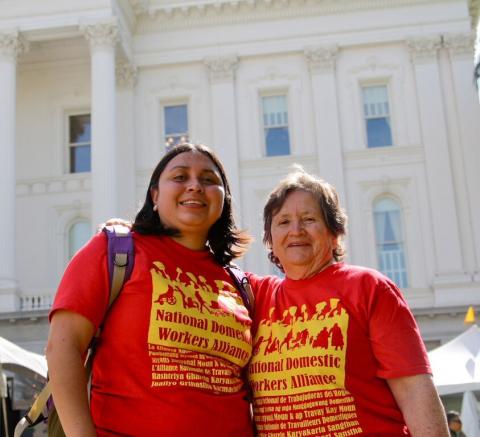 Two generation of domestic worker organizers and leaders: Claudia Reyes (left) has followed in the footsteps of her courageous mother, Maria Reyes (right). Claudia is the lead organizer for the workers’ rights program at MUA and played and important role in passing the Domestic Worker Bill of Rights in California. (Photo: Rucha Chitnis)
Two generation of domestic worker organizers and leaders: Claudia Reyes (left) has followed in the footsteps of her courageous mother, Maria Reyes (right). Claudia is the lead organizer for the workers’ rights program at MUA and played and important role in passing the Domestic Worker Bill of Rights in California. (Photo: Rucha Chitnis)
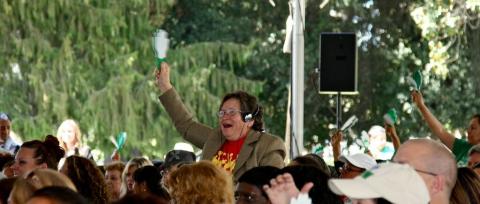 Maria Reyes is an iconic elder in the space – a former domestic worker who joined MUA nearly 17 years ago and became a powerful advocate for the rights of immigrant women. Maria has recruited hundreds of women to join MUA, participated in hunger strikes for immigrant rights, traveled countless times to Sacramento to organize for the California Domestic Worker Bill of Rights and served as President of MUA’s board of directors. (Photo: Rucha Chitnis)
Maria Reyes is an iconic elder in the space – a former domestic worker who joined MUA nearly 17 years ago and became a powerful advocate for the rights of immigrant women. Maria has recruited hundreds of women to join MUA, participated in hunger strikes for immigrant rights, traveled countless times to Sacramento to organize for the California Domestic Worker Bill of Rights and served as President of MUA’s board of directors. (Photo: Rucha Chitnis)
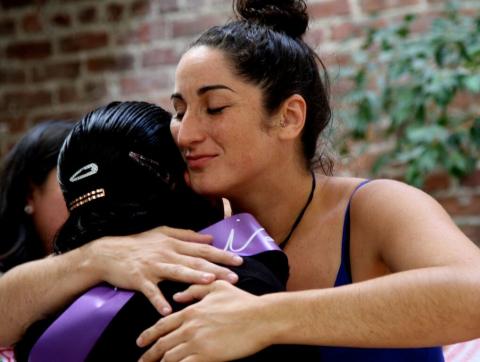 Sisterhood and solidarity are important offerings for MUA’s members, many of whom have survived violence and racism, and experienced deep marginalization based on their identity as immigrant women. (Photo: Rucha Chitnis)
Sisterhood and solidarity are important offerings for MUA’s members, many of whom have survived violence and racism, and experienced deep marginalization based on their identity as immigrant women. (Photo: Rucha Chitnis)
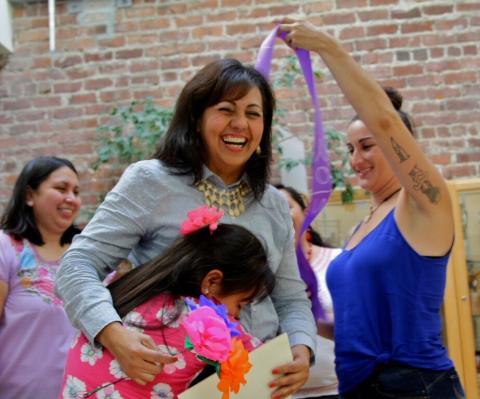 The graduation ceremony of MUA’s leadership program is a space for domestic workers and their families to celebrate and honor every woman who has begun a new chapter in her personal transformation and leadership journey. Here, Elena’s daughter runs to embrace her mother as she receives her certificate. (Photo: Rucha Chitnis)
The graduation ceremony of MUA’s leadership program is a space for domestic workers and their families to celebrate and honor every woman who has begun a new chapter in her personal transformation and leadership journey. Here, Elena’s daughter runs to embrace her mother as she receives her certificate. (Photo: Rucha Chitnis)
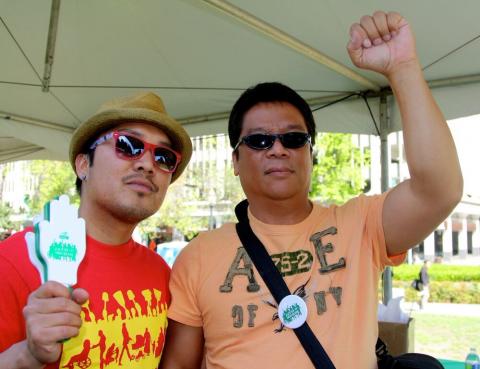 Armael Bulawin Malinis and Edgardo Pichay, male allies and community organizers at Migrante International, an advocacy group that defends the rights and welfare of overseas Filipino workers, raise their fists in solidarity with the rights of home care workers. (Photo: Rucha Chitnis)
Armael Bulawin Malinis and Edgardo Pichay, male allies and community organizers at Migrante International, an advocacy group that defends the rights and welfare of overseas Filipino workers, raise their fists in solidarity with the rights of home care workers. (Photo: Rucha Chitnis)
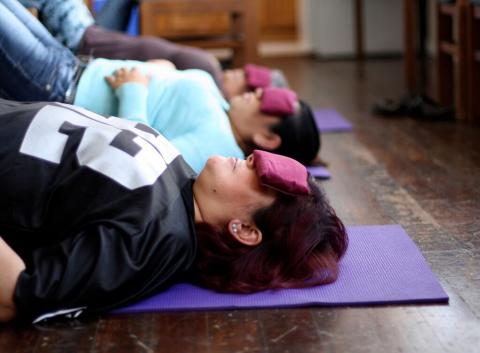 MUA offers wellness and self-care for its members. Here, members participate in a weekly yoga class offered by a volunteer at the group’s Fruitvale office. (Photo: Rucha Chitnis)
MUA offers wellness and self-care for its members. Here, members participate in a weekly yoga class offered by a volunteer at the group’s Fruitvale office. (Photo: Rucha Chitnis)
Join us in defending the truth before it’s too late
The future of independent journalism is uncertain, and the consequences of losing it are too grave to ignore. To ensure Truthout remains safe, strong, and free, we need to raise $24,000 by the end of today. Every dollar raised goes directly toward the costs of producing news you can trust.
Please give what you can — because by supporting us with a tax-deductible donation, you’re not just preserving a source of news, you’re helping to safeguard what’s left of our democracy.
